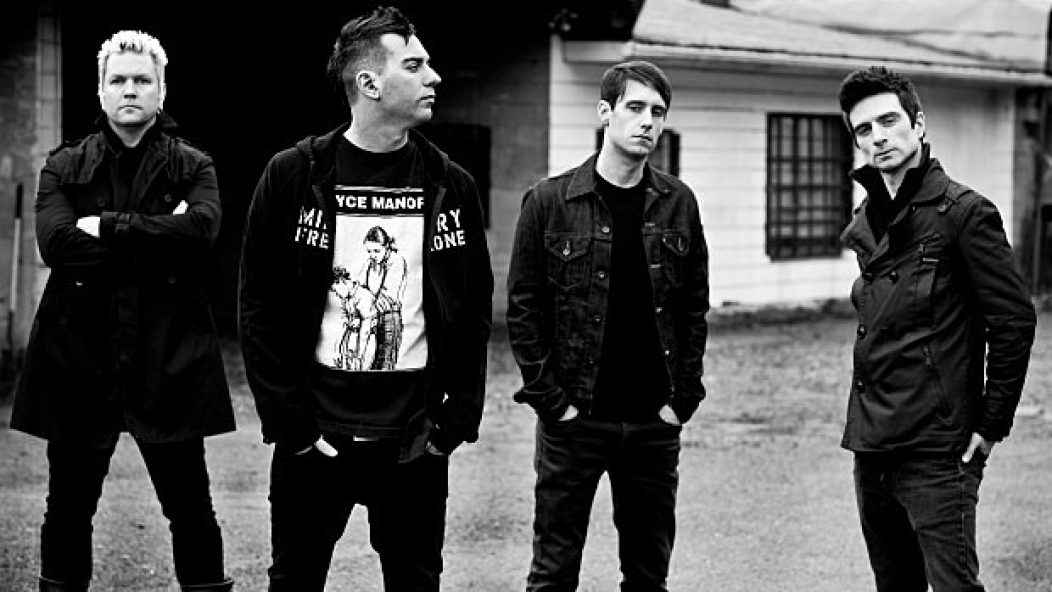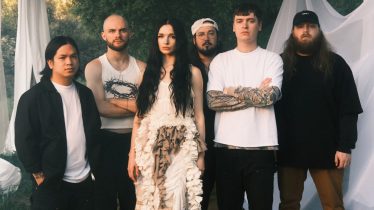
How Anti-Flag Broke My Heart: What we really mean when we cry "sell-out"
An Op-Ed by Ben Zitsman
Fourteen-year-olds are going to rebel—it’s a universal truth. What varies is the nature of that rebellion. Some kids shoplift and some kids skateboard. Some buy eyeliner and some buy liquor. Some kids shoplift eyeliner and liquor.
I was a teenage Marxist.
My rebelliousness manifested as a single-minded determination to dismantle the bourgeoisie. That I was a member of the bourgeoisie, I was convinced, only made me a more effective agent of its demise. I bought copies of The Communist Manifesto, of Bukharin’s Philosophical Arabesques, and of Trotsky’s Permanent Revolution—and I fully intended to read them all, eventually. I called my parents “crypto-fascist lackeys of imperialism” over dinner. I thought anyone who didn’t work in a factory, or grow millet or something, was a crypto-fascist lackey of imperialism.
“You don’t even produce anything,” I said to my parents. “What do you do? What are you for?”
“Well,” my father said, “I bought dinner. That’s something.”
“You bought it with money you earned exploiting the labor of the working man!” I wasn’t entirely sure what I meant by this, but it sounded right.
“I try not to exploit anyone,” my mother said. “I like to think I taught you to treat everyone well.”
“You taught me lies!” I shouted.
This happened more than once. I was, each time, sent to my room as a result.
And, in my room, I listened to Anti-Flag.
At some point this spring, Anti-Flag is going to release a new album called American Spring. It will be their 10th and will, if their past albums are any indication, include at least some of the following:
- Crunchy, distorted electric guitars.
- Lead singer Justin Sane’s signature, kinda-growly, kinda-yelpy, faux-Anglo delivery—he sounds a lot like Blitz’s Carl Fisher, but with an earnest passion Carl can’t quite summon…for anything besides soccer hooliganism.
- Hooks. Big, big hooks. Hooks that leave lyrics about the WTO’s abuse of the working man, or about depleted uranium or whatever, stuck intractably in your head.
Regardless, it’s all stuff one doesn’t normally associate with startlingly catchy music of any genre.
Still, for all I know, Anti-Flag sound entirely different now. Maybe they sold their guitars and bought synthesizers and arpeggiators, because they want to make something “real.” I doubt it, but I can’t be sure.
And that’s because I haven’t listened to Anti-Flag since 2005. That’s when I vowed to boycott their music for the rest of my life—when I threw away their posters and their CDs, and never looked back.
They were my favorite band. And they broke my heart.
• • •
The existence of a 14-year-old suburban revolutionary? It’s lonely. At least, it was for me. God knows my parents—crypto-fascists that they were—didn’t understand the struggle. Hell, they were a part of the very system I was struggling against. My friends? They were even worse. Try getting most 14-year-olds worked up about Wal-Mart’s refusal to let its workers unionize. It’s harder than organizing a union at Wal-Mart.
I would have given up, and fully inhabited that feeling of pure, acute alienation, only I didn’t have to: I had Anti-Flag. I could listen to The Terror State’s “Turncoat”—a pummeling-though-still-effervescent condemnation of then-President George W. Bush—and know someone out there got it. Someone was just as angry as I was. For that reason, I needed them. I needed Anti-Flag for solace, for commiseration. I needed them for the abreaction of teenage angst. And I needed them for merch. You get to be a certain age and, suddenly, you find cool T-shirts really matter.
Most importantly, though, I needed Anti-Flag for affirmation. Their values were my own. They were unshakably anti-corporate, and so was I; and that—that meant everything would be okay. It meant I wasn’t alone.
Then, in 2005, Anti-Flag left Fat Wreck Chords and signed a deal with RCA. All of a sudden, I felt very alone indeed. Not only that, I felt betrayed.
The bastards sold out.
It’s really no surprise that Anti-Flag signed to RCA, or that RCA wanted them in the first place. See, Anti-Flag writes pop songs. I would have never have admitted that at 14. No, I’d have insisted, Anti-Flag is punk fucking rock — but it’s the truth.
Pop, after all—with its concomitant accessibility and catchiness—is in punk’s very DNA. Listen to the Ramones’ debut record, and you’ll hear it: the sound of four guys who ingested six pounds of speed between them, listened to a Buddy Holly record, and headed to the studio. Listen to Patti Smith’s Horses; its first track is an extended riff on Van Morrison’s “Gloria.” Pop-punk is a misnomer: In the beginning, they were one and the same.
Anti-Flag carries on the great punk tradition of taking pop songs and scuffing them up a little. The result of which, as it always has been, is something truly fun. That the band can have fun while giving their songs names such as “When You Don’t Control Your Government People Want to Kill You” is testament to their considerable talent as pop-smiths. It’s also testament to their fidelity to punk’s roots.
As is signing to a major label, by the way. The Clash—unassailable paragon of punk cred, major Anti-Flag influence, and “The Only Band That Matters”—released London Calling on Columbia Records.
A decade after forswearing Anti-Flag’s music forever, I think it’s safe to say it: I’m beginning to reevaluate a few things.
• • •
Anti-Flag was my first show. I went to see them in September 2004, when they were headlining the Rock Against Bush Tour—a roving gang of politically like-minded punk acts, playing shows to encourage voter registration. (The tour would, ultimately, prove a qualified success: Rocking would be achieved; a Kerry presidency would not.) They played Columbus, Ohio’s Newport Music Hall and I went to see them.
And I didn’t feel alone.
Instead, for the first time I can remember, I felt a sense of community. I’d understood, obliquely, that other people listened to the music I listened to. That others cared about the things I cared about. I just never imagined I’d be in the same room as those people. I never imagined they lived alongside me, in my own hometown.
Yet there we all were. All of us, in our matching black Chuck Taylors, standing together, breathing the same stale air. All of us, facing the same direction and watching the same thing: Anti-Flag, playing our songs. “Ours” because we all knew the words—because we were singing along. All of us.
Remembering that night, it’s easy to wonder: How could I have begrudged the band signing to a label that could more widely distribute their music? How, when it means another “teenage Marxist” might have heard Anti-Flag—someone who otherwise wouldn’t have? If what I loved about the music was that it made me feel less alone, then shouldn’t I have wanted as many other people to hear it as possible?
Well yeah, probably. But 14-year-olds are assholes. The prospect of Anti-Flag getting a little more popular—a little less uniquely mine—terrified me. So when the band signed to RCA, I didn’t take it well.
It can’t be that simple, though. I reacted to Anti-Flag’s move to the majors not like a fan of their music, but like a scorned lover. I tore up their posters like they were old photographs; I threw out their albums like they were love letters. I went full Young Werther. And, while 14-year-olds may be assholes, they—for the most part—aren’t insane. There was something else going on.
The asshole was in love.
• • •
What makes us love bands?
What makes us love them, as opposed to merely liking them? There are, after all, thousands of bands I like. I’m not a discriminating listener. Yet I can count the bands I love on two hands. Why is that? If it’s so easy for me to like a band, then why is it so hard for me to love one?
Because loving a band is like loving anything else: as much about the subject of affection as the object. It’s as much about us as it is about the thing we love. To love a band, we must hear an echo of our own voice—however faint—in their music.
When I think about the bands I love today, I realize just how true this is. In the Magnetic Fields’ music, I hear the voice of someone convinced, if he’s clever enough, people won’t notice just how sad he really is: I’ve been that guy. In the Replacements’ best songs, I hear feelings of quotidian suburban disaffection turned into a howl of gorgeous anguish—into something mood-altering and time-dilating, something great. I’ve felt that disaffection, and have wished I could turn it into something half as beautiful.
In Anti-Flag, at 14, I heard righteous indignation and passion—the very things I was feeling. I heard myself in those songs. So, when Anti-Flag signed to RCA, thereby making concessions to capitalism and to the Establishment, to that which they ostensibly hated, some part of me had to wonder: Is this my fate? Will I grow up and make concessions, too?
Will I become the thing I hate?

Let’s talk about plague doctors.
The guys who, during Europe’s bubonic plague outbreaks, treated the afflicted in their homes. The guys who dressed up like gigantic hell-penguins to do so—flowing black robes, wide-brimmed hat, a beak-like mask to protect against the miasma of death all around them. Those guys.
Before plague doctors would walk into a home stricken by the plague, they’d recite a defensive incantation: “abracadabra.” It had already been used for millennia, at that point, to ward against disease. Quintus Serenus Sammonicus, one of the Roman Empire’s better physicians, advised using it to protect against malaria.
Abracadabra: a simple, time-tested phrase for people who find themselves close to the repugnant and contagious. A verbal prophylactic.
Just like “sellout.”
When I accused Anti-Flag of selling out, I was reciting a defensive incantation—protecting myself against selling out, too. I was severing ties, was formally renouncing them. I was ensuring I’d never compromise, would never concede to that which I hated. I was saying “abracadabra.”
It didn’t work.
• • •
I’m writing this from a Starbucks. I am, right now, wearing a pair of chinos. I still own my Marxist literature, and I still haven’t read most of it. I probably never will.
If the 14-year-old version of myself met me today, he would be disgusted. In fact, he just might be heartbroken. Because I, too, have sold out.
There could be, however, another word for what I am: older. I grew up. I learned about economics and I learned about myself. It turns out Marxism's pretty dicey in practice. It turns out calling your parents reactionaries doesn't make you a radical by default.
Maybe that's all selling out really is—a kind of growing. Maybe no one ever sells out. Maybe they just grow up.
Whatever it is I've done, it feels all right. I am, at least, finally ready to listen to Anti-Flag again. I’ve missed them.








